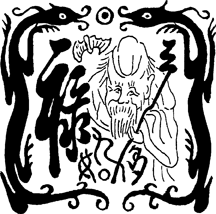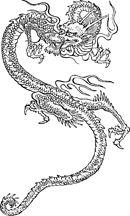
David Millians
Many wooyee have ties with hsunchen folk, while others serve as agents of the imperial government, working with headmen and magistrates, who may be their relatives. In rural villages, wooyee are often the primary source of special magic and healing for their communities.
 The wooyee of Kralorela do not have a specific shamanic practice. Any wooyee practitioner that has Spirit Face and relationships to two or more spirits from any tradition or practice of 1W2 or better gains a fetch, usually through dramatic circumstances. Many wooyee never progress to the point of having a fetch.
The wooyee of Kralorela do not have a specific shamanic practice. Any wooyee practitioner that has Spirit Face and relationships to two or more spirits from any tradition or practice of 1W2 or better gains a fetch, usually through dramatic circumstances. Many wooyee never progress to the point of having a fetch.
Many commoners follow small parts of the practices described below. For example, the patriarch of almost every clan in the empire knows some skills of the Ancestor Practice.
Entry requirements: Be Kralori, usually related to teacher.
Abilities: Astrology, Be Unseen, Body Heat, Dismember Self, Dragon Roads, Dream Divination, Feign Death, Fetch, Fly, Herbalism, Know Local Spirits, Kralori Myths, Open Spirit World, Read Omens, Read Scales of the Lizard, Remove Own Head, Resist Blades, Resist Heat, Shamanic Escape, Spirit Face, Spirit World Travel, Tend Illness, Tend Wound
Virtues: Wooyee come in all varieties, but most are Secretive about their traditions.
Relationships: Family, Master or Teacher, Spirit Ally, Spirit Place, Village; to Practice
Traditions & Practices
Wooyee may join as many traditions and practices as they can, for they are all considered unified in the Elder Dragon Way. A wooyee may have as many charms and fetishes as her Spirit Face rating divided by four.
Ancestor Practice
Ancestors are lineages are vital links in the society of Kralorela. Deceased ancestors are still considered part of the family and join in many seasonal and personal events. Practitioners use the ability of Worship Ancestor to bring their departed kindred back in some form to participate and even bless family gatherings for festivals, births, weddings, funerals, and so forth.At the end of each emperor’s reign, the souls of the blessed deceased pass on with him, but ancestor worshippers remain able to contact some vestiges of their ancient lineages. Many departed family members, of course, spend time in the court of Udam Bagur, the Lord of the Underworld, and their jailers may require bribes to allow them the temporary freedom to enjoy a ceremony with their descendants. The recently dead often appear quite tangible, as they join in a family feast, to those with Spirit Sight, but more distant ancestors are vague and noble.
Entry requirements: The practitioner must learn the ways of this practice from a relative.
Abilities: Ancestor Practice Knowledge, Consecrate Ancestral Shrine, Stories of Ancestors, Summon Ancestor, Worship Ancestors
Virtues: Chaste, Filial, Honorable, Proud.
Spirits:
- Ancestors (Curse Unfilial Descendant 13 to 7W, Family Lore 10 to 10W, Fertility 17, Healthy Family 10 to 20, Respect Elders 15, Protect Child 15, Settle Dispute 8 to 5W)
- Ghost spirits (Banish Ghosts 10 to 10W, Hide from Ghosts 10 to 20, See Ghosts 15, Talk to Ghosts 15 to 5W)
Fetishes: Ancestor fetishes are usually made from many, usually inexpensive, substances and often portray faces, children, or a family sigil.
Secret: Channel Ancestor (Results vary but will often include traits listed above, plus those particular to the ancestor channeled, all in the 1W2 to 10W3 range. Kralori families keep detailed genealogical records, some stretching back hundreds of generations.)
Secret Requirements: Filial, Spirit Face, and relationship to ancestor spirit of 1W2 each.
Other Side: Ancestor worshippers can travel to the underworld (10W3) or to Summerland Heaven and the realms of past Dragon Emperors (10W3 and higher). All such realms are bureaucratic in nature, and spirit travelers must navigate the official requirements to find their kin.
Other Connections: Ancestor worship permeates the basic society of Kralorela and draws on many ancient traditions. Many followers of this practice are people of significance for their clans and in their communities.
Disadvantages: This practice is associated with the common people, and while the more educated and enlightened of society often still honor their ancestors, they know that this practice is worldly.
Four Vices Practice
This practice is diverse and, thankfully, rare. Its practitioners usually desire shortcuts to their goals and use the practice spirits to weaken their enemies.Entry requirements: All are welcome, though a potential practitioner will have to find a teacher to initiate him in the practice.
Abilities: Desecrate, Dissemble, Four Vices Practice Knowledge, Tales of the Four Vices, Worship Four Vices
Virtues: All negative personality traits.

Spirits: Some practice spirits have a single trait, while others are combinations. Ratings range from 6 to 6W
- Ignorance spirits (Cowardice, Deceit, Despair, Discord, Disloyalty, Disrespect, Envy, Impatience, Mischief, Procrastination)
- Illusion (Extravagance, Guilt, Impiety, Selfishness, Shame, Sorrow, Unfiliality, Vanity, Wrath)
- Materialism spirits (Excess, Greed, Violence)
- Sensation spirits (Gluttony, Indolence, Lust)
Fetishes: Practice fetishes include blindfolds, fans, and pillows inscribed with cryptic words; lurid books and amulets; broken writing tools; defaced imperial coins; impious icons of the gods; and serrated knives with unwholesome inscriptions.
Secret: Community Vice (The practitioner’s spirits can affect multiple targets, depending on success level.)
Secret Requirements: One spirit relationship, Spirit Face, and Worship Four Vices at 1W2 each.
Other Side: The Empire of Vice mirrors the land and society of Kralorela. Its inhabitants are passionate spirits of vice, dwelling in false beauty and splendor.
Other Connections: Followers of this practice are often part of larger networks of evil cultists and organizations. Many turn to ways of Sekever.
Disadvantages: Kralori society condemns this practice as the most abominable, and its followers are persecuted where discovered.
Hungry Ghost Practice
This secretive practice has existed in Kralorela for eons, but it gained strength and prevalency in the wake of Emperor Yanoor’s death, for the hungry dead became much more common. For a time, the False Dragon Ring supported such cultists and drew on their power, but wise Emperor Godunya banned such practices long ago. In spite of this, there are those who continue to draw power from the hungry dead. Practitioners lurk on the edges of society and seek victims to feed the needs and whims of their spirits.
Hungry ghosts most commonly require sacrifices of food and blood, for the hunger for what they had in life and no longer enjoy. Their hungers, though, can vary, and some may demand sacrifices of anything from liquor to knowledge to sex.
Entry requirements: Must make a blood sacrifice to the hungry ghosts.
Abilities: Cook, Hungry Ghost Lore, Hungry Ghost Practice Knowledge, Knife, Stalk, Worship Hungry Ghosts.
Virtues: Greedy, Hungry, Selfish.
Spirits:
- Hunger spirits (Curse 10 to 5W, Devour 10 to 20, Hungry 10 to 10W)
- Hungry Ghost spirits (Hungry Ghosts can have any ability known to Kralorela. Ratings will range from 5 to 15W.)
- Ghost spirits (Banish Ghosts 10 to 10W, Hide from Ghosts 10 to 20, See Ghosts 15, Talk to Ghosts 15 to 5W)
Fetishes: Practitioners make their grisly fetishes from the remains of their offerings to the ghosts.
Secret: Devour Life (The practitioner can consume the entire soul and flesh of a victim, gaining an lingering bonus equal to the victim’s highest ability, duration depending on the degree of success. See below under Disadvantages.)
Secret Requirements: A relationship to a Hungry Ghost, Spirit Face, and one practice Virtue of 1W2 each.
Other Side: This practice has no otherworldly connections, for hungry ghosts are trapped in the Middle World. See below under Disadvantages.
Other Connections: Followers of this practice are often part of larger networks of evil cultists and organizations.
Disadvantages: Firstly, Kralori society condemns this practice, and its followers are persecuted where discovered. More deeply significant, every time a practitioner uses the Practice Secret, he must test his rating in the Secret against his highest non-practice relationship trait. Any failure results in a lingering penalty, while a complete defeat draws the practitioner’s spirit from his body, and he becomes a hungry ghost.
Lord Dragon Practice
This rare practice draws upon the ancient hsunchen practices of Kralorela, though in limited form. Some scholars speculate that the Path of Immanent Mastery derived from these teachings.Almost every Kralori has hsunchen ancestry, though few would believe, much less acknowledge, this fact. The most common is Deer, but Wolf is also frequent in northern provinces. Much less common are Boar, Bull, Chicken, Crane, Monkey, Orca, and Turtle. Others are extremely rare.
A few followers of this practice move beyond it into the more esoteric and even mystical possibilities of dragons, while others join hsunchen traditions.
Entry requirements: Must have hsunchen blood, but this is rarely acknowledged or even known by everyday Kralori.
Abilities: Hsunchen Customs, Dragon Myths, Know Local Wilderness, Lord Dragon Practice Knowledge, Speak [Beast Tongue], Worship Dragons.
Virtues: Authoritative, Proud
 Spirits:
Spirits:
- Beast spirits (Beast Body 10 to 10W, Beast Head 10 to 10W, Claws 5 to 5W, Fangs 5 to 20, Fly on Spirit Breezes 10 to 20, Strong 15 to 5W, Tough 15 to 5W)
- Dragon spirits (Dragon Claws 5 to 15W, Dragon Eye 5 to 5W, Dragon Jaws 15 to 5W, Dragon Wings 15 to 20, Dragon Wisdom 15)
Fetishes: These practitioners make their fetishes of animal parts, usually their ancestral Beast.
Secret: Manifest Horned Beast (This Secret augments the abilities of the three or more mastered spirit relationships, effectively allowing them to rise above the limitations listed above.)
Secret Requirements: One Beast spirit relationship and two Dragon spirit relationships of 1W2 each.
Other Side: The Primeval Forest, home of the elder beasts, children of the Great Dragon, is full of spirits and wonders. Some Kralori scholars conclude that it is the Garden of Temptation.
Other Connections: Many commoners respect this tradition. Some practitioners have connections with hsunchen tribes, though the true beast people can be suspicious.
Disadvantages: The educated of Kralorela look down on this practice, some even considering it a dangerous dragon path or of questionable loyalty and prosecuting its members.





